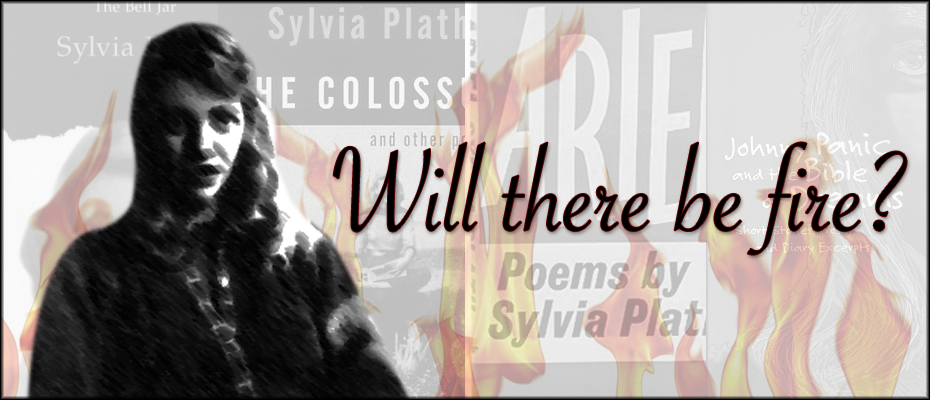I know of no other
poet, living or not, whose work read by others could fill the 2,500-seat Royal
Festival Hall as Sylvia Plath’s did yesterday. That alone must be a testament
to the enduring appeal of her work.
Three lecterns at the
front of the stage stood equally spaced in front of a semicircle of chairs from
which the performers would rise in groups to deliver Plath’s Ariel poems in the
order in which they were left when she died.
Plath groupie that I am, I found it an extraordinary thing simply to be
in the same room as Plath and Ted Hughes’s daughter, Frieda, who introduced the
evening. During the afternoon I had visited the flat in which fifty years ago,
Sylvia Plath ended her life, whilst the woman speaking now – then an infant -
and her brother were sealed in an adjoining room. Now here she was, a
middle-aged woman a little older than me introducing a reading of her mother’s
work.
 |
| The stage set up for the performance |
Frieda Hughes
remarked that she had wondered what to wear for the evening, joking as she gestured
towards the other performers that she had plenty of others from whom to seek
advice. She described each of the two versions of Ariel as important and
was at pains to point out, I felt, that her own ‘restored’ version was not
intended to replace the one edited by her father, but to stand alongside it.
Frieda asked that the audience refrain from applauding individual poems – no
matter how strongly they felt the need – and save their shows of appreciation
for the end. Thus the readings began – though Frieda may have come to regret
her plea, as each set of three readings was received with loud coughing
–presumably people had been desperately stifling them during the readings.
I would characterise
the evening as very successful. A triumph, even – though not without its ups
and downs. According to the one-side-of-A4 programme, it was Gerda Stevenson who
kicked off the readings. Her energetic reading of the poem contrasted with my
own internal reading, and set the tone for the evening.
 |
| Outside the hall, an hour before the show |
Who could follow
that, I wondered. Juliet Stevenson, of course, reading one of my favourite Ariel
poems, ‘Tulips’. Delivered calmly and confidently but with feeling – I was a
little surprised when she fluffed a line – perhaps two. Presently it was time
for Ruth Fainlight to read ‘Elm’. Fainlight was the only performer other than
Frieda to speak any words that were not Sylvia Plath’s, explaining briefly that
‘Sylvia’ had dedicated the poem to her. A little later, during the reading of
the ‘Ariel’ poem, she seemed a little frail, leaving the stage with the aid of
a stick and seemingly bidding goodbye to her fellow performers. Happily she
returned about thirty minutes later.
As I said, there were
lows as well as highs. I agree with the sentiments expressed by Angel DeMonica in her review on Sylvia Plath Info, about the delivery of
‘Poppies in October’, which I felt was delivered in a somewhat perfunctory manner. A little later however, as the actors sat down and the lights dimmed, we were about to experience
the highlight of the event: The famous recording of Sylvia Plath reading
‘Daddy’. Her voice seemed bright and clear without any of the background hiss
that I’m used to hearing as a backing-track to the reading. Her black and white
picture filled the screen which had until now held the moving colour images of the performers,
the static monochrome seeming to emphasise the distance of years between then
and now, even as the quality of the recorded voice served to stress the
opposite.
There were a
couple of unexpected laughs from the audience – including one towards the end
of the night for Messrs Tate and Lyall!
I found myself yearning somewhat for
some of the wonderful poems that are not included in this version of Ariel:
‘Poppies in July’, ‘Sheep in Fog’, ‘Edge’…
 |
| The view from Royal Festival Hall's balcony after the performance |
I surveyed the
all-female cast as Deborah Findlay delivered the line, ‘The bees are all
women,’ but any wishes I may have had that at least one male speaker had been
included – if only to escape from the notion that speaker in these poems can be
identified as the unmediated outpourings of Plath herself – quickly evaporated
as she lifted her head to deliver the event’s final line, ‘The bees are flying.
They taste the spring.’ A pause – then the applause that we had obediently held
back was delivered with full force.
Overall, it was an
amazing thing to spend the evening with 2,500 fellow Plathies. At their best,
the readings were thought-provoking and suggested new shades of meaning that I
had not previously considered. Plath, it seems, was right to say that the Ariel
poems should be read aloud.








